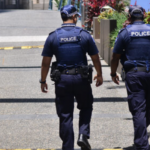The $7m Insider Trading Sting: Should Police Have Stopped It?

The Australia Federal Police (AFP) recently arrested a banker from Melbourne in an insider trading sting that resulted in $7 million in assets being seized. So what is insider trading? Exactly what happened in this case? And should authorities have intervened earlier in the lengthy investigation and prevented the man’s crimes from escalating?
What is insider trading?
Insider trading is an offence defined in the Commonwealth Corporations Act 2001. The trading restrictions in the Act mandate that a person who possesses inside information must not acquire or dispose of, or procure that another person acquires or disposes of, certain financial products, including all securities that can be traded on the stock exchange, derivatives and any other financial products that are able to be traded on a financial market. This includes trading currencies on the foreign exchange market.
For example, say you work in a company and you become aware of a major new opportunity for that company, which will affect its share price. You then buy more shares, or advise a friend or family member to buy more shares. This in turn gives a false boost to the share price of the company, heightening its value. You would not have bought the shares or advised someone else to buy them had you not known about this new opportunity. This was information that only became available to you as a result of working in that company. This is classic insider trading.
The purpose behind the provision is that those who have access to sensitive information should not abuse that position and profit from it. Insider trading can also affect or impact upon the economy at large.
The background of the case
The AFP alleges that Lukas Kamay, a 26-year-old former employee of the National Australia Bank (NAB), in cohort with a friend, Christopher Russell Hill, who worked at the Australian Bureau of Statistics (ABS), used unpublished unemployment, retail and trade data to trade in foreign exchange derivatives, namely the Australian dollar.
It is alleged that Kamay used this insider information to predict fluctuations in the Australian dollar, and was the main recipient of the profit from the trading.
He has been charged with insider trading, corruption of a public official, and money laundering. Hill is also expected to be charged with insider trading, receiving a corrupt benefit, release of sensitive information, and abuse of public office.
As a result of the investigation, the AFP seized a total of $7 million in assets, comprising of a motor vehicle, property and funds.
During the period between August 2013 and May 2014, Kamay is alleged to have made large trades on the Australian dollar, moments prior to announcements that boosted the Australian dollar.
This suggested he had a strong degree of confidence of these trades being successful.
This is one of the factors that alerted authorities to keep an eye on his trades. It is alleged that he was leaked sensitive information such as unemployment figures and other types of data by his friend Hill at the ABS, which allowed him to predict whether the Australian dollar would go up and down.
This meant he was able to use the inside information to position himself for an expected movement in the currency.
Should police have intervened earlier?
The suspicions regarding the trades by Kamay arose from trading habits noticed by one of his stockbrokers.
A broker noticed that Kamay made trades on the Australian dollar moments before an announcement was released that boosted its value.
According to an article in the Australian Financial Review, broking firm owner Mr Kerr then searched LinkedIn and spotted the connection between Kamay and Hill who worked at the ABS.
The matter was reported to authorities.
The trades in question and the subject of the charges allegedly date from August 2013 to May 2014. The ‘sting’ allowed police time to investigate further and build evidence for a case however, during that time the amount of money involved in the offences skyrocketed to $7 million.
Should the trades have been allowed to continue for so long purely for the purpose of building a case?
People who engage in insider trading have the ability to affect the economic wellbeing of our society.
Insider trading has the capacity to dislocate the market, and upset overseas investors, which in turn disadvantages small stake shareholders like ordinary mums and dads, or retirees.
Insider trading skews the ability to profit to those with access to the information.
This can have an impact on many members of the Australian community.
Another factor to consider is whether it was in anyone’s interest at all – including that of the two relatively young men involved – for authorities to have allowed their behaviour to continue.
Early intervention may have prevented the commission of further offences, and kept the amount involved to a minimum.
Stepping in earlier may well have cost police their case – but is prosecution the best or only answer in this type of situation?






